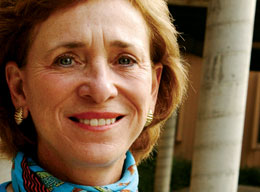Volume 26 · Number 3 · Spring 2009
Informed Dissent
(Page 3 of 5)
Nicole Woolsey Biggart: Women’s Work
Nicole Woolsey Biggart weighs in for the rights of another disadvantaged group, one rarely seen in the boardrooms and executive suites of California’s 400 largest publicly traded companies. For the past four years, Biggart, dean of UC Davis’ Graduate School of Management, has convened a news conference to announce the findings of the annual UC Davis Study of California Women Business Leaders, in partnership with the Palo Alto-based Forum for Women Entrepreneurs and Executives. As in past years, this year’s figures indicate that half of California’s 400 largest publicly traded companies have no women in top executive offices, and almost half do not have a woman in the boardroom.

Nicole Woolsey Biggart
In determining top executives, the research team relied on companies’ own listings in their Securities and Exchange Commission reports. Typically, companies list the CEO or president, chief financial officer, chief information officer and chief operating officer as executive team members. Some companies also include corporate counsel, the head of human relations and executive vice presidents. And while the findings may engender dismay, or even a few letters to editors of Silicon Valley newspapers from those who dispute the data’s implications, Biggart says what the census presents is “just data. It’s numbers, and there’s really very little to argue about.”
Biggart hopes that the study has an impact, but it’s not always a straight line from A to B. Last year the San Jose Mercury News reported the survey findings on the front page and included a commentary piece by Biggart that asked how Apple Inc. could have no women at the top. A few weeks later, Andrea Jung, the CEO of Avon, was appointed to Apple’s board, and Biggart got a call from a Mercury News reporter who, she said, wanted to connect the dots between GSM’s census and Young’s new post. “I said, ‘Well, whatever it is, it’s good. She’s a very capable woman, she runs a global company, she’s in consumer products. . . . It was probably a very wise match. And I’m glad they thought of it!’”
So, though the year-by-year gains in gender equity may be small, Biggart says gathering the data is worth it. “I think it’s an appropriate role for a public university. It’s research in the public interest.”
